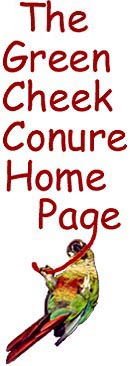 |
My
Experiences
Breeding
Green Cheeks
I only have one pair of green cheeks, so I don't have a great deal of
experience! But my pair has taught me an awful lot, and I will pass
some of this "beginner's knowledge" on to you.
My Pair:
I bought my pair, Scooter and Peanut, in August,
1996 from a breeder in Florida. They were my first breeding pair,
and were purchased with the help of two good friends. The person
we bought them from had gotten them from somebody else, having bought out
their collection. It's not a good idea to buy a "proven pair" that
isn't proven for the person you're buying from, but we didn't know this
at the time! We were also told that they were domestic and hand-fed,
but they are unbanded and very, very skittish so it's my suspicion that
they were either parent-raised or wild-caught.
The Cage Setup:
The pair was housed in a 24" x 24" x 36" long galvanized
wire cage for their first few years. More recently, I switched them
to a 18" x 30" x 36" high cage, but they figured out that they could escape
through the feed dish doors! So finally, I moved them to a 18" x
24" x 36" long cage made of 1/2" x 1" galvanized-after-welding wire mesh.
Normally I prefer not to use galvanized wire, because there is a possibility
of zinc poisoning, but I don't mind so much with the green cheeks because
they do a lot more flying than climbing, so they don't often have their
mouths on the wire. Even so, I make sure the wire is cleaned and
scrubbed before using it, to remove any particles of zinc.
The cage is outfitted with natural branches: I put
three in the 36" long cage, placing them so that the birds can fly from
one end to the other without flying into perches!
The Nestbox:
Their nestbox was made for cockatiels, but is smaller
than most cockatiel boxes. I'm not exactly sure of the dimensions,
but I believe it is around 7" wide by 10" high by 12" long. I use
aspen wood shavings in the nestbox, rather than pine shavings... and you
should never use cedar shavings!
This page is copyright ©
1998-2000 Lara deVries
|
